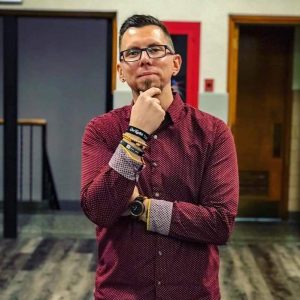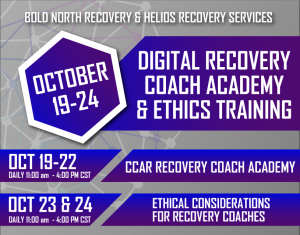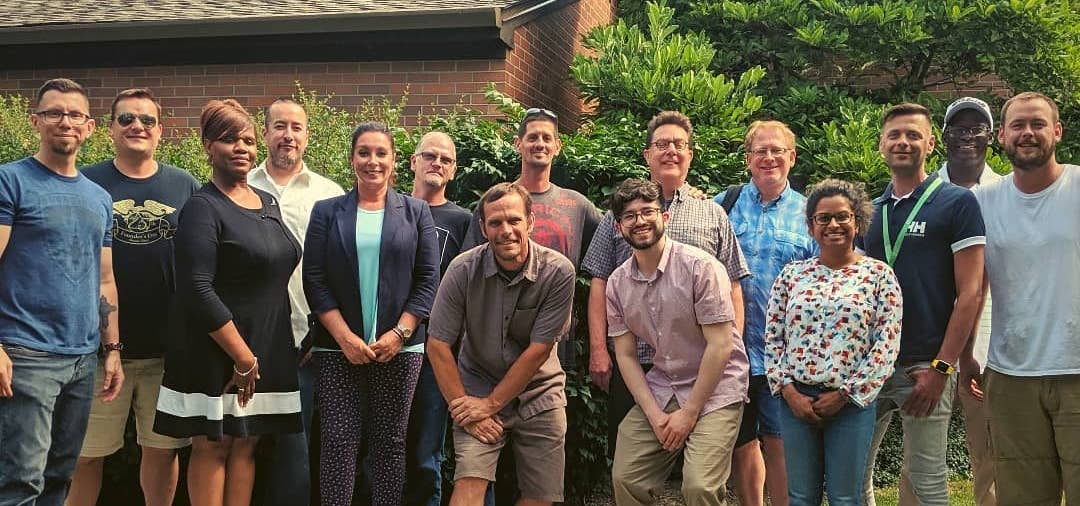Welcome to Recovery Month 2020! A month of celebration of our many pathways and journeys. It affords us the ability to be connected in community—digitally or in person—while we share and heal together. And what a month it is, with current conditions of the pandemic, social justice tension and increasingly more and more overdoses and suicide completions due to the lack of access, isolation, anxiety, and all matter of obstacles.
These are remarkably difficult times of stress for anyone, regardless of how solid a program or wellness plan you have. If you are watching the world and seeing the pain, you are impacted. That experience is valuable, as it can be the catalyst to help others walk through their own difficulties and find recovery.
Meet Jesse
 My name is Jesse Heffernan and I am person in long term substance use and mental health recovery. I’ve been in recovery for a little over 19 years. I am a Recovery Coach Professional designated by the Connecticut Community for Addiction Recovery, a recovery community organization and national leader in addiction recovery training. I want to share about my experience as a person seeking recovery, learning about recovery coaching and the values it encompasses for me.
My name is Jesse Heffernan and I am person in long term substance use and mental health recovery. I’ve been in recovery for a little over 19 years. I am a Recovery Coach Professional designated by the Connecticut Community for Addiction Recovery, a recovery community organization and national leader in addiction recovery training. I want to share about my experience as a person seeking recovery, learning about recovery coaching and the values it encompasses for me.
Maxing out to make bail
When I was 19 years old, I was in jail for bail jumping during my felony drug court trials. As it turns out, judges and district attorneys do not accept last minute calls to let them know you can’t make it and need to reschedule. While in jail, I constantly panicked about having to stay there until I was sentenced. I made several calls to family and friends, pleading for someone to bail me out. Then, my mother, who hardly had the means to do so, applied for a credit card to max out and make my bail.
While riding home with her and my brother, I experienced what some of us refer to as the “windows of clarity.” Those 5 to 45 minute windows of time, where, for whatever reason, the weight of current circumstances cuts through the substance use highjacked survival system and reality is seen and felt. I was told that I would quit using substances immediately. I needed to get a job the next day and change my life.
In that moment, I wanted that. I wanted to be free of the chaos, anxiety, incessant drive to use substances and slow passive destruction of my life. I wanted to be different. Later that evening, I was brought back to the friend’s house I was staying at. Once I knew I was in the clear, I immediately got high.
But what if, and how?
This scenario raises some very important points for me today as person in recovery. First, even if I wanted to get help, where would my family have started? Second, what would that scenario have looked like if I had access to someone who knew how to navigate the complexities of insurance, treatment qualification, community resources and getting connected to others in recovery? Lastly, I knew what was expected of me in order to change and stop using. However, what about the other areas of my life that were difficult to manage? How would I go about facilitating that transition?
Although this experience took place almost 20 years ago, it stills rings true for millions of people seeking recovery. The contrasting degrees of access and opportunity are even more stark when we talk about the intersectionality of race, gender, socio-economic status, and privilege. We need guides who know how to listen, manage their own stuff, and ask really good questions (CCAR).
Resource Accessibility & Recovery Case Management
In early 2014, I worked as a Program Coordinator for Goodwill at Harmony Café. We were a community hub of resources, community programs, music, LGBTQQIA groups, fundraisers, and so much more. I was also active in my local recovery fellowships. I would listen to the struggles folks had that were not necessarily tied to the scope of the fellowship, but more rooted in resource accessibility.
A whole new world of recovery coaches
An idea began to form that I, at the time, called a “Recovery Case Management” program. I could work with folks in recovery and their families to create goals and connect them with community resources to achieve those goals. I ran the idea by some of my leaders. Although they liked the idea, they asked for me to look and see if this was happening anywhere else. Low and behold, a simple google search for recovery case management opened a window to the world of recovery coaches and peers I did not know existed.
I continued researching to narrow down which model would align closest with the mission and values of the Café. In that process, I noticed that there was only one model at the time cited in SAMHSA grants and utilized in several states across the country. That model was the CCAR Recovery Coach Academy model.
Training to become the trainer
Fortunately, at the time, Goodwill offered its team members the ability to pursue ongoing educational training for professional development. With that, I was able to attend the training in June 2014 to become a Recovery Coach and Trainer. In the training, I learned how to look at my belief systems about recovery. I discovered how to use my story to help others. And I found out how the dynamics of power and privilege impact accessibility to services. Two incredible facilitators, Phil Valentine and Art Woodard, guided the 30+ person class. Throughout the week, they shared stories, authentic curiosity, and insightful questioning modeling servant leadership. I am especially grateful to Art Woodard, who I had the honor of co-training with in July of 2018 while being vetted to become a CCAR Core Trainer.
Recovery Coaching
So, what is a Recovery Coaching? It is a form of strength-based, healing centered support for people in or seeking recovery and family members. It is similar to life and business coaching in that it is a type of partnership where the person seeking recovery self-directs their plan while the coach provides support, guidance and options. Recovery Coaching focuses on achieving any goals important to the individual. Recovery Coaches help people access recovery, as well as access systems needed to support recovery. They are unlike licensed counselors and therapists in that coaches are non-clinical. They do not diagnose or treat substance use or any mental health issues. However, a coach may assist in accessing clinical services.
The many titles of recovery coaches
Depending on what state you live in, there may be different names for Recovery Coaches. The terms Certified Peer Specialist, Peer Recovery Specialist and others are often used interchangeably. They can also have differing scopes of service, depending on where they are located. In William White’s 2004 paper, “The history and future of peer-based addiction recovery support services,” we learn that peer based services date back to as early as 1840, with Temperance Missionaries and Managers of Inebriate Homes. Personally, one of the most powerful terms I have heard Recovery Coaches called is Compassionate Witnesses.
Today, several non-profit and for-profit organizations, including recovery community centers, treatment facilities and other public health programs, employ Recovery Coaches and Peers. While this has been a great stride in providing opportunities for employment and resources for people, we also need to be mindful to maintain the fidelity of the Coaching lane so one does not become appropriated into clinical, or “go-fer” type roles. Our experience and expertise provide us invaluable insight, and, once trained, become our tools to help others.
In the next three blogs for In the Rooms during Recovery Month, I am going delve deeper into concepts and strategies I believe enhance and affirm the power and potential of the Recovery Coach role. These include exploring Healing Centered Engagement, Servant Leadership, Emotional Intelligence and Cultural Humility. All of these inextricably tie to personal, professional and community recovery development.
Upcoming Training
 Recovery Coach Academy & Ethical Considerations
Recovery Coach Academy & Ethical Considerations
October 19-24, 2020
For more information, visit heliosrecovery.com.
To register for the training, please email: boldnorthrecovery@gmail.com.




1 Comment
Does the recover coachi g train have a cost. Very interested . I’ve bee sober for 26 + years . Worked in treatment centers in early 90 s for 3 yrs. Currently attending 2 to 3 meetings a week. Live near Dallas Texas I’m 64 . Can you helpme me